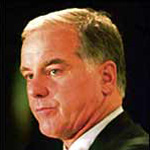By Nancy Remsen
Published March 14th 2008 in Burlington Free Press
MONTPELIER -- Supporters said instant runoff voting would enhance democracy.
"The system guarantees that the person elected is the choice of the majority," argued Rep. Christopher Pearson, P-Burlington, as he led a charge in the House on Thursday for a bill that would allow instant runoff voting for Vermont's congressional races starting in the fall.
Critics said instant runoff voting would cause unnecessary confusion.
"If this is the greatest thing since apple pie," said Rep. Mary Morrissey, R-Bennington, "then why would it not have spread like wildfire across the country?"
The Senate embraced this proposed change in the election process for Vermont's federal offices. Thursday, the House gave the bill preliminary approval by a vote of 81-60.
Despite the likelihood that the House will pass the bill today, the measure faces an almost-certain veto by Gov. Jim Douglas. At his weekly news conference, he declared, "I don't support IRV. I really believe IRV is a hypothetical election."
Assistant House Democratic Leader Floyd Nease of Johnson responded to word of Douglas' opposition.
"It would be a shame if Gov. Douglas continued to block efforts to improve democracy in Vermont," Nease said. He had argued during the debate that "all instant runoff voting does is allow you to avoid a runoff election."
Instant runoff voting would come into play in races where there were more than two candidates and no candidate received 50 percent or more of the votes cast. Voters would have ranked their preferences among all the candidates. In a three-way election, for example, if a voter's first choice were eliminated for having the least number of votes, the voter's second choice would be tallied in the instant recount.
The bill would apply only to races for the U.S. House of Representatives beginning in 2008 and for the U.S. Senate in future elections.
If Rep. Peter Welch, D-Vt., runs for re-election in the fall and the bill becomes law, he would be the first statewide office-holder to be affected by the changed election process. He supports the proposal.
"Anything that has the potential of increasing voter participation and helping Vermonters' voices be heard at the ballot booth is good for democracy," Welch said Thursday. "IRV has the potential to do that."
The Legislature and the governor allowed Burlington to revise its charter and adopt instant runoff voting for its most recent, multi-candidate mayoral election.
Pearson noted that only a few ballots in that election were filled out incorrectly and exit polling found that voters weren't confused by the new system.
About 10 other states use this kind of system for overseas and military voters, and several California cities have adopted instant runoff voting, Pearson said. Vermont would become the first state to adopt it for a statewide election, he said, but added that it has worked in cities with many times more voters than this state's electorate.
Pearson suggested there is public support for the change based on votes of support taken in more than 50 towns.
Critics challenged this evidence, noting that many towns hadn't weighed in on the issue.
"For a major change like this, we need to hear from the entire state," said Rep. Kurt Wright, R-Burlington. He reminded lawmakers that Burlington residents had the chance to vote on whether to adopt instant runoff voting.
Rep. Jim Condon, D-Colchester, worried that instant runoff voting might discourage candidates from enunciated strong positions on issues for fear of alienating voters.
Rep. Gary Gilbert, D-Fairfax, countered, "I see it as a bill that would eliminate power politics and a candidate who would play to a limited base. It is a bill that would produce statesmen."
Most House Republicans remained uneasy with the proposal. Rep. Tom Koch, R-Barre, said he preferred to stick with the existing system.
"The candidate who gets the most votes wins. It may not be a majority," Koch said, "but it has worked for 200 years."
"The system guarantees that the person elected is the choice of the majority," argued Rep. Christopher Pearson, P-Burlington, as he led a charge in the House on Thursday for a bill that would allow instant runoff voting for Vermont's congressional races starting in the fall.
Critics said instant runoff voting would cause unnecessary confusion.
"If this is the greatest thing since apple pie," said Rep. Mary Morrissey, R-Bennington, "then why would it not have spread like wildfire across the country?"
The Senate embraced this proposed change in the election process for Vermont's federal offices. Thursday, the House gave the bill preliminary approval by a vote of 81-60.
Despite the likelihood that the House will pass the bill today, the measure faces an almost-certain veto by Gov. Jim Douglas. At his weekly news conference, he declared, "I don't support IRV. I really believe IRV is a hypothetical election."
Assistant House Democratic Leader Floyd Nease of Johnson responded to word of Douglas' opposition.
"It would be a shame if Gov. Douglas continued to block efforts to improve democracy in Vermont," Nease said. He had argued during the debate that "all instant runoff voting does is allow you to avoid a runoff election."
Instant runoff voting would come into play in races where there were more than two candidates and no candidate received 50 percent or more of the votes cast. Voters would have ranked their preferences among all the candidates. In a three-way election, for example, if a voter's first choice were eliminated for having the least number of votes, the voter's second choice would be tallied in the instant recount.
The bill would apply only to races for the U.S. House of Representatives beginning in 2008 and for the U.S. Senate in future elections.
If Rep. Peter Welch, D-Vt., runs for re-election in the fall and the bill becomes law, he would be the first statewide office-holder to be affected by the changed election process. He supports the proposal.
"Anything that has the potential of increasing voter participation and helping Vermonters' voices be heard at the ballot booth is good for democracy," Welch said Thursday. "IRV has the potential to do that."
The Legislature and the governor allowed Burlington to revise its charter and adopt instant runoff voting for its most recent, multi-candidate mayoral election.
Pearson noted that only a few ballots in that election were filled out incorrectly and exit polling found that voters weren't confused by the new system.
About 10 other states use this kind of system for overseas and military voters, and several California cities have adopted instant runoff voting, Pearson said. Vermont would become the first state to adopt it for a statewide election, he said, but added that it has worked in cities with many times more voters than this state's electorate.
Pearson suggested there is public support for the change based on votes of support taken in more than 50 towns.
Critics challenged this evidence, noting that many towns hadn't weighed in on the issue.
"For a major change like this, we need to hear from the entire state," said Rep. Kurt Wright, R-Burlington. He reminded lawmakers that Burlington residents had the chance to vote on whether to adopt instant runoff voting.
Rep. Jim Condon, D-Colchester, worried that instant runoff voting might discourage candidates from enunciated strong positions on issues for fear of alienating voters.
Rep. Gary Gilbert, D-Fairfax, countered, "I see it as a bill that would eliminate power politics and a candidate who would play to a limited base. It is a bill that would produce statesmen."
Most House Republicans remained uneasy with the proposal. Rep. Tom Koch, R-Barre, said he preferred to stick with the existing system.
"The candidate who gets the most votes wins. It may not be a majority," Koch said, "but it has worked for 200 years."
 On March 16th, Former Vermont Governor and Democratic National Committee Chair Howard Dean continued his support for instant runoff voting on Vermont Radio's Mark Johnson Show. Commenting on Burlington's recent IRV election, Dean said "I think the best and most democratic way to use to elect people in multiparty elections is instant runoff voting." Dean also supported the system when it was first used in Burlington in 2006.
On March 16th, Former Vermont Governor and Democratic National Committee Chair Howard Dean continued his support for instant runoff voting on Vermont Radio's Mark Johnson Show. Commenting on Burlington's recent IRV election, Dean said "I think the best and most democratic way to use to elect people in multiparty elections is instant runoff voting." Dean also supported the system when it was first used in Burlington in 2006. Citizens of Burlington, Vermont went to the polls on Tuesday, March 3rd to vote for the second time in an election using instant runoff voting. At 8:25 PM, the city declared that incumbent Mayor Bob Kiss had won reelection in the third and final round of counting, narrowly edging out challenger Kurt Wright, 51.5% to 48.5%. The race was unique in that it had four candidates that had a legitimate shot at winning: Progressive Kiss, Republican Wright, Democrat Andy Montroll, and independent Dan Smith. In most other American cities, there would be fear of "spoiler" candidates, but IRV allowed all four candidates to run without having to worry about being labeled "spoilers."
Citizens of Burlington, Vermont went to the polls on Tuesday, March 3rd to vote for the second time in an election using instant runoff voting. At 8:25 PM, the city declared that incumbent Mayor Bob Kiss had won reelection in the third and final round of counting, narrowly edging out challenger Kurt Wright, 51.5% to 48.5%. The race was unique in that it had four candidates that had a legitimate shot at winning: Progressive Kiss, Republican Wright, Democrat Andy Montroll, and independent Dan Smith. In most other American cities, there would be fear of "spoiler" candidates, but IRV allowed all four candidates to run without having to worry about being labeled "spoilers." On April 4, Vermont governor Jim Douglas chose to veto legislation to re-establish majority elections for Congress in his state through instant runoff voting. Vermont would have been the first state to enact IRV for Congress; legislative leaders affirmed their commitment to the bill, and it is sure to move in the state again. FairVote has worked hard to support this legislation, which likely generated more than 600 phone calls to the governor from Vermonters.
On April 4, Vermont governor Jim Douglas chose to veto legislation to re-establish majority elections for Congress in his state through instant runoff voting. Vermont would have been the first state to enact IRV for Congress; legislative leaders affirmed their commitment to the bill, and it is sure to move in the state again. FairVote has worked hard to support this legislation, which likely generated more than 600 phone calls to the governor from Vermonters.